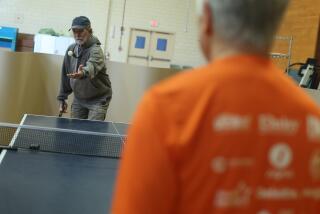Murder-Suicides Are Rarely the Result of a ‘Pact’
- Share via
“Terminally Ill Man, 87, Kills 86-Year-Old Wife and Then Self.”
“Older Couple’s Deaths Called Murder-Suicide.”
“Illness May Have Played a Role in Elderly Couple’s Murder-Suicide.”
Headlines such as these give the words “till death do us part” ominous new meaning--and related statistics are even more alarming.
Each year, more than 500 homicide-suicides, or 1,000 deaths, occur among people 55 years and older, and experts say those figures are increasing. Older adults are now twice as likely as younger adults to commit such acts. The causes are complex, but topping the list are undiagnosed depression, failing health, caregiver stress and loss of independence and control.
Contrary to popular belief, a mutual romantic “pact” to head into eternity together rarely exists.
“Nearly 20 older Americans die each week in a homicide-suicide. For the most part, these are not crimes of love or altruism; they’re acts of depression and desperation,” says University of South Florida professor Donna Cohen, a nationally recognized expert who has been researching and collecting data on the phenomenon for a decade. “To call them ‘pacts’ is inaccurate. They’re not joint decisions. Ninety-nine percent of the time, the husband makes the decision to kill his wife and himself. She’s not a willing or knowing participant.”
Cohen, who gathers data through interviews with families and medical examiners, says there are three types of homicide-suicide in older couples. The most common scenarios involve a depressed, elderly man caring for a sick, suffering wife, or, less frequently, spouses who are both sick and dependent on each another. In both situations, the man faces an unwanted change in the relationship.
“Maybe there’s going to be a move to a nursing home. Maybe it’s a decline in health, perceived or real, his or hers,” says Cohen. “These men, who all their lives have been in charge, are suddenly helpless. They’re hopeless. They can’t care for and protect their wife anymore, and they see no other way out than death.”
Almost a third of elderly homicide-suicides occur when there is a history of marital problems or domestic violence. Common factors include a pending or actual separation, threatening behavior and restraining orders against the husband. For example, when 78-year-old Josephine Giaimo of East Haven, Conn., was killed in July by her estranged husband Frank (who then killed himself), she had already filed for divorce and gotten two restraining orders to protect herself.
“Many of these men are controlling personalities, used to having things their way,” says Cohen. “But whatever the situation, homicide-suicides are aggressive acts perpetrated out of depression and an inability to make things better.”
In almost all cases, the preferred method is guns. Most victims are shot and killed in their sleep. Most perpetrators are middle- or upper-class men. Almost all elderly men who attempt a murder-suicide succeed.
Despite discouraging statistics, Cohen says there are often things family members and friends can do to help prevent these tragedies. Because the husband is usually the perpetrator, she suggests watching for the following signs in a spouse, father or male relative: a history of controlling behavior, changes in eating or sleeping, crying for no apparent reason, talk of hopelessness, threats to harm the wife, loss of interest in activities that used to give pleasure, anxiety, and giving things away that are important to them.
“If you are at all concerned, don’t be afraid to sit down with your dad and say directly, ‘Have you ever thought you or you and mom would be better off dead?’” says Cohen, who is developing an intervention plan for at-risk individuals.
“Don’t worry about giving him ideas. If the answer is yes, ask him if he has a plan. The more detailed the plan, the higher the risk. Ask whether there are any guns in the house and if there are, remove them. Call a crisis hotline in your area or seek the help of a geriatric specialist. These are lethal, traumatic events that impact families and communities, but in many cases they can be averted.”
Korky Vann writes for the Hartford Courant, a Tribune company.






